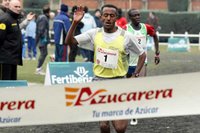If you are an outdoors enthusiast, it does not get any better than October! The crisp fall air and the breathtaking hue displayed across the landscape in this season are truly refreshing. It is the best time of the year to go out and enjoy a run and take in the scenery nature offers.
For the marathon enthusiasts, the fall season is in full swing with some impressive performances already in the books. Both Ethiopian men and women national records have been broken within the past month by Haile Gebrselassie in Berlin and Berhane Adere in Chicago, respectively. The marathon excitement is sure to continue every weekend, at least through November.
In particular, this year’s edition of the New York City marathon is a race to watch as the legendary cyclist Lance Armstrong makes his
much anticipated attempt at marathon running. Another celebrity scheduled to run in the New York race is the Olympic Champion Gymnist
Shannon Miller. New York has also assembled an
incredible line up of elite runners to go after the title of the most famous foot race in the world.
While New York City Marathon is still one week away, the next major marathon on the calendar is
Marine Corps Marathon in Washington, D.C. This marathon is nick named “Marathon of the Monuments” (runners will pass many prominent monuments along the way) and is also affectionately known as “The People’s Marathon”. The 31st annual run will take place tomorrow October 29th.
In a stark contrast to the “who’s who” line up anticipated in New York next week, Marine Corps Marathon does not host any elite runners, and does not offer cash to the winners, but rather caters to “The People” (with notable exceptions such as Oprah Winfrey and Al Gore) who run for the sake of running and not to make a living.
Along the same line, while many of the world’s other major marathons showcase the talented
Ethiopian elite runners, “The People’s Marathon” will showcase a group of regular Ethiopians who run for the sake of running and not to make a living. In fact, this year’s edition of Marine Corps Marathon is perhaps poised to set the “record” for the most number of non-elite Ethiopian runners ever assembled in any marathon race in history.
To be exact, there are at least seven regular Ethiopians registered to run the Marine Corps Marathon this coming Sunday: Anchinlema, Bete, Dereje, Tequame, Mamo, Fikru, and myself. In May 2006, we all agreed to register for the marathon and began training for it. Anchinlema, Dereje, Tequame, Mamo, and I had completed one or more marathons in the past (check
here for more on my previous marathon) while Bete and Fikru were planning to make their first attempt at the distance. Several of us got together for a
half-marathon in mid-July but aligning our schedule to be able to train together proved an impossibility.
All of us have our different reasons for running, but one thing is for certain: it is not to earn money. In fact, some of the group members are coming from out of state to do this marathon and thus have incurred considerable cost on airfare and hotel expenses, in addition to the registration fee of $94. One member of the team, Anchinlema, is even raising funds by
dedicating her run for a very noble cause of funding research to cure Autism.
So, my dear friends Anchinlema, Bete, Dereje, Tequame, Mamo, and Fikru: I salute your courage in dedicating yourself to train for, and attempt to run, a marathon. You are doing it not for any gain but for the satisfaction of pushing yourself to the limit both physically and mentally. I especially salute you, Anchinlema, for going above and beyond in your effort to bring a cure for children suffering from Autism, one of whom is my own beloved son
Addis.
All of us have encountered our own ups and downs amidst training due to injuries, illness, accident, and hectic summer schedules. The marathon day has now arrived. Some of us may set personal records while others may not get to the finish line. One thing is certain, however; I know for a fact that all of us will be at the starting line when the gun goes off, ready to give “The People’s Marathon” nothing less than our best.
As
John Bingham would say, “The miracle isn’t that I finished. The miracle is that I had the courage to start.”
 3-Dec-06 Disproving doubters. Proving Berlin was not a fluke. Haile showed that he can beat anyone by defeating two-time World Marathon champion Jaouad Gharib of Morocco. 2006 is the year we witnessed Haile became a complete marathoner.
3-Dec-06 Disproving doubters. Proving Berlin was not a fluke. Haile showed that he can beat anyone by defeating two-time World Marathon champion Jaouad Gharib of Morocco. 2006 is the year we witnessed Haile became a complete marathoner.  11-Mar-06 In Moscow, Meseret Defar defended here 2004 World Indoor 3000 M title easily defeating World record holder and home favorite Liliya Shobukhova. It seems like the sky is the limit for Meseret Defar.
11-Mar-06 In Moscow, Meseret Defar defended here 2004 World Indoor 3000 M title easily defeating World record holder and home favorite Liliya Shobukhova. It seems like the sky is the limit for Meseret Defar. 12-Mar-06 Kenenisa became the first athlete win a World Outdoor Championships, a World Cross Championships and a World Indoor Championship. He toyed with the field wining over 3000 M at the World Indoor Championships.
12-Mar-06 Kenenisa became the first athlete win a World Outdoor Championships, a World Cross Championships and a World Indoor Championship. He toyed with the field wining over 3000 M at the World Indoor Championships. 10-Sep-06 Once again Meseret Defar wins a race. Only this time it’s controversial because Tirunesh Dibaba’s loss cost Tirunesh $125,000. We now have ourselves a rivalry. May the best woman win.
10-Sep-06 Once again Meseret Defar wins a race. Only this time it’s controversial because Tirunesh Dibaba’s loss cost Tirunesh $125,000. We now have ourselves a rivalry. May the best woman win.  3-Jun-06 Meseret Defar sets a new Womens 5000 M world record 14:24.53, snatching the record from Turkey’s ex-Ethiopian runner Elvan Abeylegesse's. It was a 0.15 second improvement. Nonetheless, this one was sweet.
3-Jun-06 Meseret Defar sets a new Womens 5000 M world record 14:24.53, snatching the record from Turkey’s ex-Ethiopian runner Elvan Abeylegesse's. It was a 0.15 second improvement. Nonetheless, this one was sweet.  22-Oct-06 The way Berhane Adere disposed of Galina Bogomolova in the Chicago marathon made us wonder if she should have been marathoning all along. She sure looked like a natural setting a new Ethiopian record of 2:20.47.
22-Oct-06 The way Berhane Adere disposed of Galina Bogomolova in the Chicago marathon made us wonder if she should have been marathoning all along. She sure looked like a natural setting a new Ethiopian record of 2:20.47. 26-Sep-06 Haile Gebrselassie and Gete Wami set Ethiopian records while winning this Marathon Majors event. This was a reminder that they have not faded yet. Gete ran 2:21:24 and this record was later broken by Berhane Adere.
26-Sep-06 Haile Gebrselassie and Gete Wami set Ethiopian records while winning this Marathon Majors event. This was a reminder that they have not faded yet. Gete ran 2:21:24 and this record was later broken by Berhane Adere.  2-Apr-06 Running two races in two days in, 2002,2003,2004,2005 and now 2006 Kenenisa Bekele wins the long and short race at the World Cross Country Championship. Kenenisa has won ten titles during the last five years and single handedly brought an end to the era of Kenyan cross country dominance. No one will ever dominate this event like Kenenisa Bekele has.
2-Apr-06 Running two races in two days in, 2002,2003,2004,2005 and now 2006 Kenenisa Bekele wins the long and short race at the World Cross Country Championship. Kenenisa has won ten titles during the last five years and single handedly brought an end to the era of Kenyan cross country dominance. No one will ever dominate this event like Kenenisa Bekele has. 




